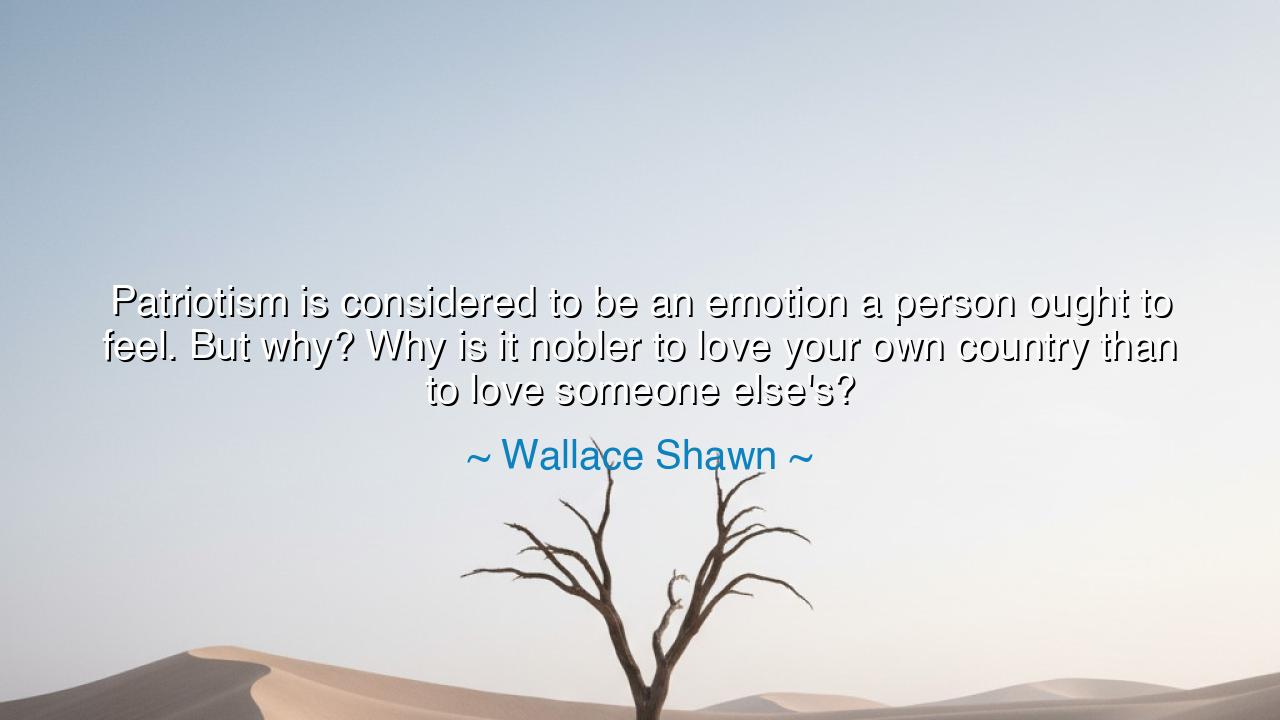
Patriotism is considered to be an emotion a person ought to
Patriotism is considered to be an emotion a person ought to feel. But why? Why is it nobler to love your own country than to love someone else's?






The playwright and thinker Wallace Shawn once asked with piercing honesty: “Patriotism is considered to be an emotion a person ought to feel. But why? Why is it nobler to love your own country than to love someone else's?” In these words lies a challenge to the heart and mind alike. Shawn calls us to examine the foundations of our loyalties, to question the automatic reverence we grant to borders and flags, and to consider the universality of love, justice, and human connection. Patriotism, he suggests, is not inherently virtuous simply because it is national; its nobility must be measured by the moral content of that love.
In the eyes of the ancients, the love of one’s city or homeland was intertwined with duty, honor, and courage. Yet philosophers like the Stoics reminded their disciples that virtue transcends place, and that justice and compassion are universal. Shawn’s reflection carries this ancient wisdom into modern times: to assume that love of one’s own country is automatically higher than love for another is to confuse geography with morality. True devotion is measured not by the boundary lines one honors, but by the principles one upholds.
History provides both examples and cautionary tales. Consider the soldiers of World War II who fought for countries that demanded unquestioning loyalty. Many demonstrated heroism and devotion to their homelands, yet others recognized that humanity demanded compassion across national lines, offering aid to the vulnerable regardless of nationality. The moral courage of those who transcended narrow patriotism—such as individuals who sheltered refugees or resisted unjust orders—shows that nobility is not defined solely by allegiance to soil, but by allegiance to justice and human dignity.
Shawn’s words also provoke reflection on the social construction of patriotism. Nations often teach that loyalty to the homeland is a primary virtue, while love for other peoples is secondary, suspect, or even dangerous. Yet this hierarchy is arbitrary. To love humanity beyond borders does not diminish care for one’s community; it enlarges the heart and strengthens the moral fiber of the citizen. Patriotism, when unexamined, can become a cage, restricting empathy and valorizing arbitrary distinctions over universal truths.
Consider the story of Raoul Wallenberg, a Swedish diplomat who saved thousands of Hungarian Jews during the Holocaust. His actions were guided not by allegiance to a single nation, but by an unwavering commitment to human life and dignity. In his courage, Shawn’s question finds clarity: nobility is not in loving one country over another, but in acting with conscience, courage, and compassion where they are most needed. Wallenberg’s patriotism was global in its moral scope, even as he served his nation through moral example.
The deeper meaning of Shawn’s reflection is that patriotism gains moral weight only when aligned with justice, compassion, and ethical discernment. Blind attachment to a flag or nation is insufficient; it can even be dangerous when it excuses wrongdoing. True patriotism does not exist in isolation—it is measured by the good one does, the protection of the vulnerable, and the fidelity to moral truths that transcend borders.
The lesson for all generations is profound: love your country, but do not worship it uncritically. Examine its actions, challenge its injustices, and extend care and concern beyond its borders. Recognize that the nobility of emotion lies not in its object, but in the ethical and moral framework within which it is expressed. Patriotism devoid of conscience is hollow; when guided by reflection and compassion, it becomes a force for good in the world.
Practically, this teaching calls citizens to balance loyalty with universal empathy. Engage in civic life with critical thought, support policies that honor justice both at home and abroad, and cultivate love for humanity as well as one’s nation. Question nationalistic rhetoric that discourages moral reflection, and act courageously when ethical duty demands crossing borders of comfort or convention. In doing so, one exemplifies Shawn’s insight: nobility of heart is not defined by whom one loves first, but by the courage, compassion, and justice one extends in love.






AAdministratorAdministrator
Welcome, honored guests. Please leave a comment, we will respond soon